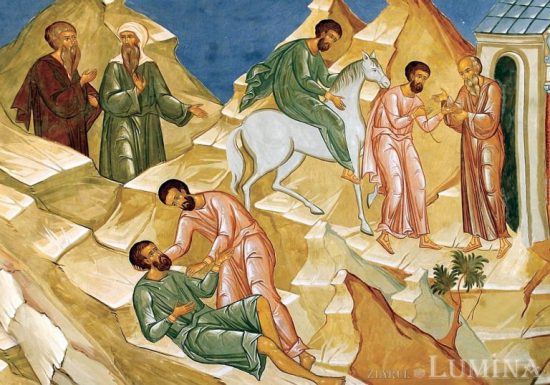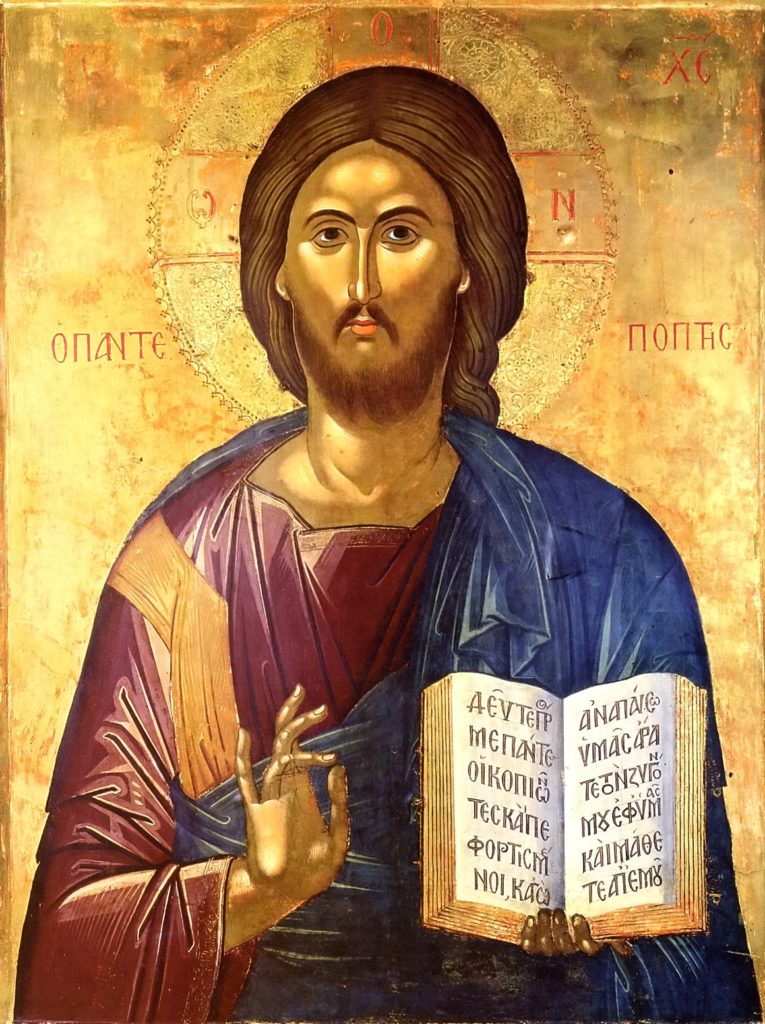The 19th Sunday after Whitesuntide – Sermon on the mount – Love of enemies
Apostle 2 Corinthians 11, 31-33; 12, 1-9
31 The God and Father of the Lord Jesus, who is to be praised forever, knows that I am not lying. 32 In Damascus the governor under King Aretas had the city of the Damascenes guarded in order to arrest me. 33 But I was lowered in a basket from a window in the wall and slipped through his hands.
I must go on boasting. Although there is nothing to be gained, I will go on to visions and revelations from the Lord. 2 I know a man in Christ who fourteen years ago was caught up to the third heaven. Whether it was in the body or out of the body I do not know—God knows. 3 And I know that this man—whether in the body or apart from the body I do not know, but God knows— 4 was caught up to paradise and heard inexpressible things, things that no one is permitted to tell. 5 I will boast about a man like that, but I will not boast about myself, except about my weaknesses. 6 Even if I should choose to boast, I would not be a fool, because I would be speaking the truth. But I refrain, so no one will think more of me than is warranted by what I do or say, 7 or because of these surpassingly great revelations. Therefore, in order to keep me from becoming conceited, I was given a thorn in my flesh, a messenger of Satan, to torment me. 8 Three times I pleaded with the Lord to take it away from me. 9 But he said to me, “My grace is sufficient for you, for my power is made perfect in weakness.” Therefore I will boast all the more gladly about my weaknesses, so that Christ’s power may rest on me. 10 That is why, for Christ’s sake, I delight in weaknesses, in insults, in hardships, in persecutions, in difficulties. For when I am weak, then I am strong.
The Gospel of Luke 6, 31-36
1 Do to others as you would have them do to you.
32 “If you love those who love you, what credit is that to you? Even sinners love those who love them. 33 And if you do good to those who are good to you, what credit is that to you? Even sinners do that. 34 And if you lend to those from whom you expect repayment, what credit is that to you? Even sinners lend to sinners, expecting to be repaid in full. 35 But love your enemies, do good to them, and lend to them without expecting to get anything back. Then your reward will be great, and you will be children of the Most High, because he is kind to the ungrateful and wicked. 36 Be merciful, just as your Father is merciful.
How to love that one who harmed you, persecuted you, cheated you, threatened you, put your life in danger? What advice may be this? Who would dare to encourage an act of such weakness, when the only objective, right, logical variant is to return the harm, to take revenge or even eliminate the enemy? However, the Sermon from the mountain, this real biblical treaty which comprises the fundamental ideas of Christ, our Lord says exactly what we wouldn`t like to hear, He inconveniences us and urges us to wake:
43 “You have heard that it was said, ‘Love your neighbor[a] and hate your enemy.’ 44 But I tell you, love your enemies and pray for those who persecute you, 45 that you may be children of your Father in heaven. He causes his sun to rise on the evil and the good, and sends rain on the righteous and the unrighteous. (Matthew 5, 43-45).
All the basis of the Old Testament is dynamited. Love, the neighbor and enemy are redefined and resized.
Christ`s hero is humble and loving
And I say again, how to love your enemy? How to ask Nicolae Steinhardt to love his persecutors from jail, Anița Nandriș Cudla to love the Bolsheviks who took her away of her mother and husband, how to say with Nicole Valeria Bruteanu (Nicole Valey Grossu) `blessed be jail`?
It is touching and devastating in the same time. This is even more intense as media and Hollywood movies offer us concrete perspectives regarding the act of revenge, offer us examples, instruments and motivate us to act in a tough way while Christ tells us: Stop! Do not hate! Do not decant angriness! Do not rush after revenge. Christ`s hero is humble and loving, the hero of the world is proud and ready to shed blood. The first one is powerful by the fact that he presents himself weak, the last is weak because he wants to prove he is powerful, power relies on love not on wickedness.
The enemy is the person for whom we can`t have love
What is the enemy in fact ? Father Sophrony from Essex in the spirit of Saint Silouan defined the enemy as the person whom we can`t love, for whom we can`t have any good thought. Again, there is something very difficult to manage, we see we are surrounded by enemies. Not only the man who is your declared enemy, but any man you can`t love.
To comprehend this reality it means to become aware of the incredible mission of the Christian, of the spiritual labor he is called for, of the vigilance which must be cultivated without cease in relation with our fellowmen for not allowing enmity to find shelter in our heart.
The love of the enemy offers to the suffering another perspective
In fact the revolution of Christ is the revolution of love. The question which appears is : To what extent to love? Love of our enemies does it imply the trust in him? Quoting the monk from Rohia, love is not negociated, it is compulsory but in the same time it doesn`t oblige you to have trust. I forgive you but don`t ask me to trust you. Why? Because my love doesn`t necessarily imply the structural change of the persecutor.
They don`t say anywhere that those who forgave their enemies and loved them changed them as well
In some cases it happened it is true : Longinus the centurion or Saul from Tarsus, by Christ`s love changed, but in most of the cases the persecutor remained a persecutor for others. Christ`s love is not intermittent, it is perpetual, for He is Love, but this didn`t turn all people in some loving ones. Important is that love changed the perspective of the suffering from the odious hate and revenge to the bright love for our neighbor. It helped him to overcome the pain provoked by the physical and psychical suffering caused by the bad one and save his soul by his thought watered by love. This one is for sure a different man. The key is even more important as love changes his own being, kills the passionate self and highlights the spiritual one, the resemblance with God. Thus Christ asks us to love, to pray for those who harm us and help them in case they fall into trouble, but He doesn`t ask us to believe in them, in their habits, in their promises, in their schedule.
The man resembles God when he loves and he is His son in the measure in which he belives in Him. This is one of the meanings of the words found in the Sermon from the mountain: that you may be children of your Father in heaven. (Matthew 5, 45).
Persecution takes the form defining the age, but it still remains a persecution. Wherever there is a persecution, there is inevitably a persecutor and a persecuted.
The present times haven`t escaped us of persecutors. Some of these led by good intentions came to the wish to purge, starting with the past. What a dictatorial reflex.
Bothered by the perenniality of the Christian values, they openly hit the edifice of Christ or hit it in a hidden way.
They behave like some real enemies. Despite this, we have the same duty to love them, to pray for one another and for them, but what is very important, we shouldn`t trust not even for a moment in their plan pretending to be tolerant. Let us say NO to hate and enmity and YES to love and discernment!
Pr. Lect. Univ. Dr. Liviu Vidican-Manci
Source: http://ziarullumina.ro









